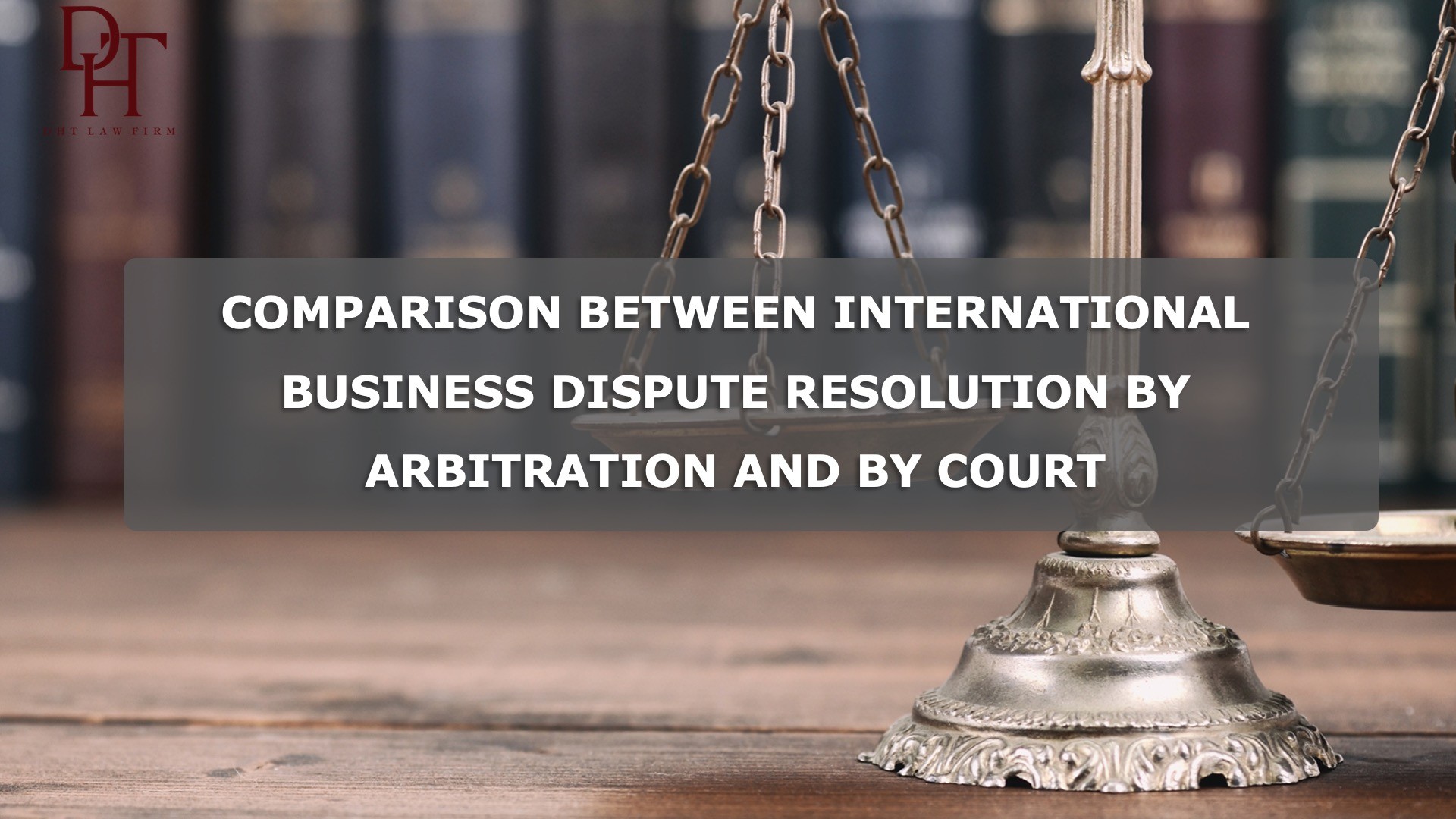
COMPARISON BETWEEN INTERNATIONAL BUSINESS DISPUTE RESOLUTION BY ARBITRATION AND BY COURT

Commercial arbitration and Court are two main methods used to resolve business disputes. In this day and age, arbitration has been a method of dispute resolution chosen by many individuals and organizations because of its superior characteristics, especially in the commercial field. According to statistics on the portal of the Vietnam International Arbitration Center, in 2021, 270 cases have been accepted and resolved. Domestic disputes accounted for 42.7%, disputes involving at least one foreign direct investment party made up 39.2%, and 18.1% of disputes involving foreign elements. In this article, Dai Ha Thanh Law Firm will compare two dispute resolution methods which are Court and Arbitration, evaluate their advantages and disadvantages, and provides some notes on the formation of an arbitration agreement to help readers have the most general view when participating in the international business dispute resolution process, to help readers have the best overview to select the most optimal method for the international business dispute or any kinds of commercial disputes.
- Similarities
First, Court and Commercial Arbitration are both used as methods of resolving commercial disputes in general and international business disputes in particular. Judges and arbitrators are the ones who listen to the pleadings and evidence presented by the disputing parties and apply the law to settle disputes . On the other hand, Commercial Arbitration and Court both operate based on common principles such as respecting the parties' right to self-determination and ensuring the independence of Judges and Arbitrators.
- Differences

|
Criteria |
Court |
Commercial Arbitration |
|
Legal basis |
Code of civil procedure 2015 |
- Law on commercial arbitration 2010. - Resolution 01/2014/NQ-HĐTP on March 20, 2014, of the Council of judges of the people’s supreme court. |
|
Authorization
|
Jurisdiction according to the case The jurisdiction of the court is broader than that of commercial arbitration. The Civil Code stipulates that the Court has jurisdiction to settle business and commerce disputes in general; including many fields in addition to 02 cases where the Arbitrator has jurisdiction. In addition, the law also stipulates that all business and commercial disputes that do not fall under the jurisdiction of other agencies or organizations will fall under the jurisdiction of the Court without the agreement of the parties. |
Jurisdiction according to the case Disputes shall be resolved by arbitration if the parties have an arbitration agreement. The arbitration agreement may be made before or after a dispute occurs. Disputes fall under the jurisdiction of arbitration: - Disputes between the parties arising from commercial activities. – Disputes between parties arising in which at least one party engages in commercial activities. - Other disputes between the parties as prescribed by law shall be resolved by arbitration. |
|
Territorial jurisdiction The petition will only be accepted by the court when it is transferred to a place of the competent court for settlement. Jurisdiction will be determined based on: + The agreement of the disputing parties. However, the consideration of whether the selected Court has jurisdiction or has to be based on the law of that country, or; + Other criteria prescribed by law, including mutual legal assistance agreements, conventions, and international treaties to which the two parties are parties; International trade practices; National law,... |
Territorial jurisdiction Arbitration does not raise questions of jurisdiction or territory. The disputing parties shall have the right to choose any arbitration center to conduct their settlement according to their will and confidence. When the dispute has been agreed by the parties to an arbitration center for settlement, that center has the right to accept the dispute.
|
|
|
Procedure |
Dispute resolution procedures at the Court include the following basic steps: - Plaintiff files a lawsuit - The Court accepts - Preparing for the first-instance trial - First-instance court proceedings - Appeal, protest - Preparing for an appellate trial - Court of Appeal - Execution of judgment
*The court's trial regime is a two-level trial (first instance, appellate) and cassation or retrial. |
- In case the parties have had an arbitration agreement, the arbitration will be conducted according to the agreement of the parties including the selection of an arbitrator and provisions on the arbitration procedure - In case the parties do not agree, the procedure is often as follows: + Plaintiff files lawsuit + Accepting the lawsuit + Defendant files the Statement of Defense + Establishment of an arbitral tribunal. + Prepare to resolve the case + Mediation; + Organize meetings to settle disputes and make arbitral decisions. Note that this procedure may vary depending on the arbitration institution. |
|
Fee |
Court fees are lower. However, if the trial is prolonged, the total cost may be much higher than the arbitration fees of the Arbitration Centers. |
Arbitration fees are higher, as the arbitrator is a non-governmental organization with independent finance, and the main source of income is the arbitration fee for each case. |
|
Time |
Court proceedings which go through many steps, often take more time |
Arbitration proceedings are fast |
|
Effect |
First-instance decisions and judgments may be appealed, and legally effective decisions and judgments with errors may still be reviewed according to Cassation or Retrial Procedures. |
The arbitral awards are final |
|
Enforcement |
The Court's decisions and judgment possess state power and ensure enforcement, so it shall be respected and strictly obeyed by agencies, organizations and individuals. |
The arbitral awards are only binding on the parties. If the losing party does not enforce the award, then the intervention of the Court with public power is required for the enforcement. |
|
Place |
The place of the trial is the court determined by law |
The parties are free to choose the place of arbitration, otherwise, the Arbitral Tribunal shall determine the place of arbitration it considers appropriate. |
|
Confidentiality |
There are public and closed trials, and post-trial judgments are often published on websites such as: |
The arbitration hearings shall not be conducted in public unless the parties have agreed otherwise. |
Thus, some advantages of the arbitration method can be mentioned as follows: (i) the location of dispute settlement: the parties will make an agreement on choosing a location, (ii) higher confidentiality: this will be important in maintaining business reputation and secrets, (iii) the time for handling and resolving cases by arbitration will be shorter than Court due to the complex procedures, also it will cost the parties more time, money and effort. Especially, when there is an international dispute, settling by arbitration will benefit the parties as they minimize language differences as the majority of arbitrators have better foreign language skills as they are more exposed to international disputes than most judges.
On the other hand, it is also necessary to consider the advantages of dispute settlement by Court, including (i) court fees/advancements; fee/advance fees: if a case with the same dispute value is under 100 million, the court fee/advancement will be less than 5 million VND , and for the Vietnam International Arbitration Center, the fee will be 16.5 million VND ; (ii) the Court’s procedures are stricter, and (iii) the Court's judgments are more effective and also highly coercive since it is a state-powered organization, however, as the court has a complicated adjudication system, the enforcement of the Court's judgment often takes a long time.
- Notes on the formation of the arbitration agreement

The formation of an arbitration agreement is a prerequisite and mandatory as a basis for the arbitration's jurisdiction. An arbitration agreement is defined in Clause 2, Article 3 of the Commercial Arbitration Law 2010, it may be established in the form of a specific clause in a commercial contract or an independent written agreement or other written equivalent forms. The arbitration agreement will remain in force even if the contract is changed, renewed, terminated, completely voided or unenforceable. In the event that the arbitration agreement is invalid or the arbitration agreement cannot be performed, the jurisdiction will automatically belong to the Court. Accordingly, one of the parties is entitled to initiate a lawsuit at the Court to request the resolution of a dispute. In practice, in the trial activities in Vietnam, the arbitration clause should note some of the following contents:
Firstly, in the event that the parties have reached an arbitration agreement with a specific arbitration clause, but this clause does not mention the form of arbitration (Arbitration or Permanent Arbitration) or does not specify the correct name of the arbitration organization, then the arbitration law allows the parties to renegotiate. However, suppose the disputing parties cannot find a common voice. In that case, the arbitration organization and the corresponding form of arbitration will be conducted at the request of the Plaintiff (the petitioner).
Second, the choice of applicable law is one of the advantages of commercial arbitration. However, the choice of applicable law must comply with the principle that disputes without foreign elements shall apply Vietnamese law for settlement, and disputes with foreign elements shall apply the law chosen by the parties. choose. If the parties do not agree on the applicable law, the Arbitral Tribunal shall decide to apply the most appropriate law.
Third, although the parties have the right to choose the language in the arbitration proceedings, it should be noted that for disputes without foreign elements, the language used is Vietnamese, for disputes involving foreign elements, the language used shall be agreed upon by the parties.
Finally, failure to provide for the above matters in the arbitration clause in advanced shall not render the arbitration agreement void or unenforceable. However, the clearer and more detailed the arbitration clause, the more it will prevent the parties from arguing about additional criteria, leading to the passiveness of the parties in the process of resolving disputes by commercial arbitration. At the same time, clearly defining the dispute settlement criteria will help the parties be more proactive when disputes arise.
It should be mentioned that, in practice, the parties have both agreed to settle disputes at commercial arbitration and in court. In this case, if the arbitration agreement is not void and enforceable, the parties are still entitled to file a lawsuit at the arbitration office. However, if a lawsuit has been filed at the Court and the Court has accepted the settlement according to the general procedure without any previous action to initiate the arbitration, the Arbitrator will naturally no longer have jurisdiction to settle the case.
In summary, in order for the arbitration clause to have legal effect and serve as a basis for dispute resolution at the arbitral tribunal, the parties should note the contents mentioned in this article as well as refer to the provisions of this article. samples of arbitral bodies.
Here is the advice of Dai Ha Thanh Law Firm on two international business dispute resolution methods as well as the advantages and disadvantages of whether to use the method of dispute resolution by Court or Arbitration. Our intention is to provide information to the Client when engaging in dispute resolution. We - Dai Ha Thanh Law Firm with a team of well-trained lawyers and legal advisors are committed to providing professional legal services to customers. If detailed advice is required, please liaise with us for professional and effective assistance.

